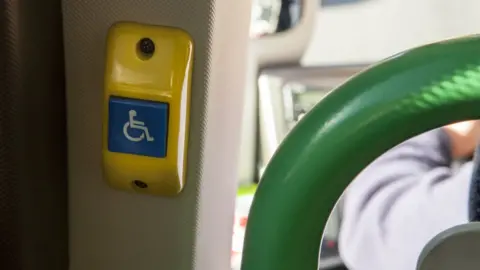Transport cuts hit disabled people, says Disability Wales
 Getty Images
Getty ImagesPeople with disabilities are suffering from cuts to public transport and a lack of adapted taxis, according to Disability Wales.
The group claimed it means many disabled people cannot get out and about.
Campaigners said disabled people need access to a range of transport options, including buses and trains.
The Welsh Government said it is committed to making all modes of transport accessible.
One authority - Bridgend - is considering cuts this financial year of £188,000 in the cash it gives to bus firms.

Miranda Evans, policy and programmes manager at Disability Wales, said: "The whole situation we're in around cuts to local bus services and various other transport provision is that it is having a huge detrimental impact on people's ability to achieve independent living."
"Disabled people aren't able to be spontaneous and travel when they want, where they want and how they want, like everyone else," she told BBC Wales' Sunday Politics Wales programme.
"Transport needs to be looked at in the broadest possible way to ensure that disabled people can access a range of different transport modes, so whether that's taxis, buses, trains, planes - the lot, just to make sure that they are able to have a journey to wherever they want to go, and be able to have those connections."
Bridgend Council's cabinet Member for communities, Richard Young, said his authority has to cut £188,000 in subsidies to bus companies in order to meet budget requirements.
"That's a major trauma for some people," he acknowledged, adding the council was looking at the possibility of extending community transport.
Simon Green, chairman of the Bridgend Coalition of Disabled People said: "To cut a bus service that a disabled person relies on to get into town, to get work, to go see friends, to go out on social activities, will be absolutely detrimental to that person's mental health."

Helen Fincham, 23, from Bridgend, is recovering from a rare virus from two years ago that means she now uses a wheelchair.
She relies on taxis to get around, but there are not enough with disabled access available.
"Ringing up taxis at the moment, they're expecting you to give them a day's notice, or on a day like today when it's lovely and sunny, when I'd love to go out, I'd just ring up a taxi company and they'd just turn around and say no straight away," she said.
"On one occasion, on a Sunday, I rang six different companies, and the responses straight away were no, on most of them."
Under the 2010 Equality Act, it is illegal for private hire vehicles to refuse to take a person with disabilities, unless they have a medical exemption from the licensing authority.
The responsibility for taxi and private hire regulations in Wales moved from London to Cardiff in April.
'High level of service'
A Welsh Government spokesman said it has consulted on proposals to reform the current regime of taxi licensing "to ensure all passengers in Wales receive a consistently high level of service in safe, quality vehicles with trained drivers".
"Whilst this is often the case, we are all too aware of the issues raised by Disability Wales and others about the availability of accessible taxis," the spokesman added.
"We will continue to work with the taxi sector and disabled people to ensure that no matter the location or circumstance, passengers across Wales get the level of service they deserve and rightly expect".
